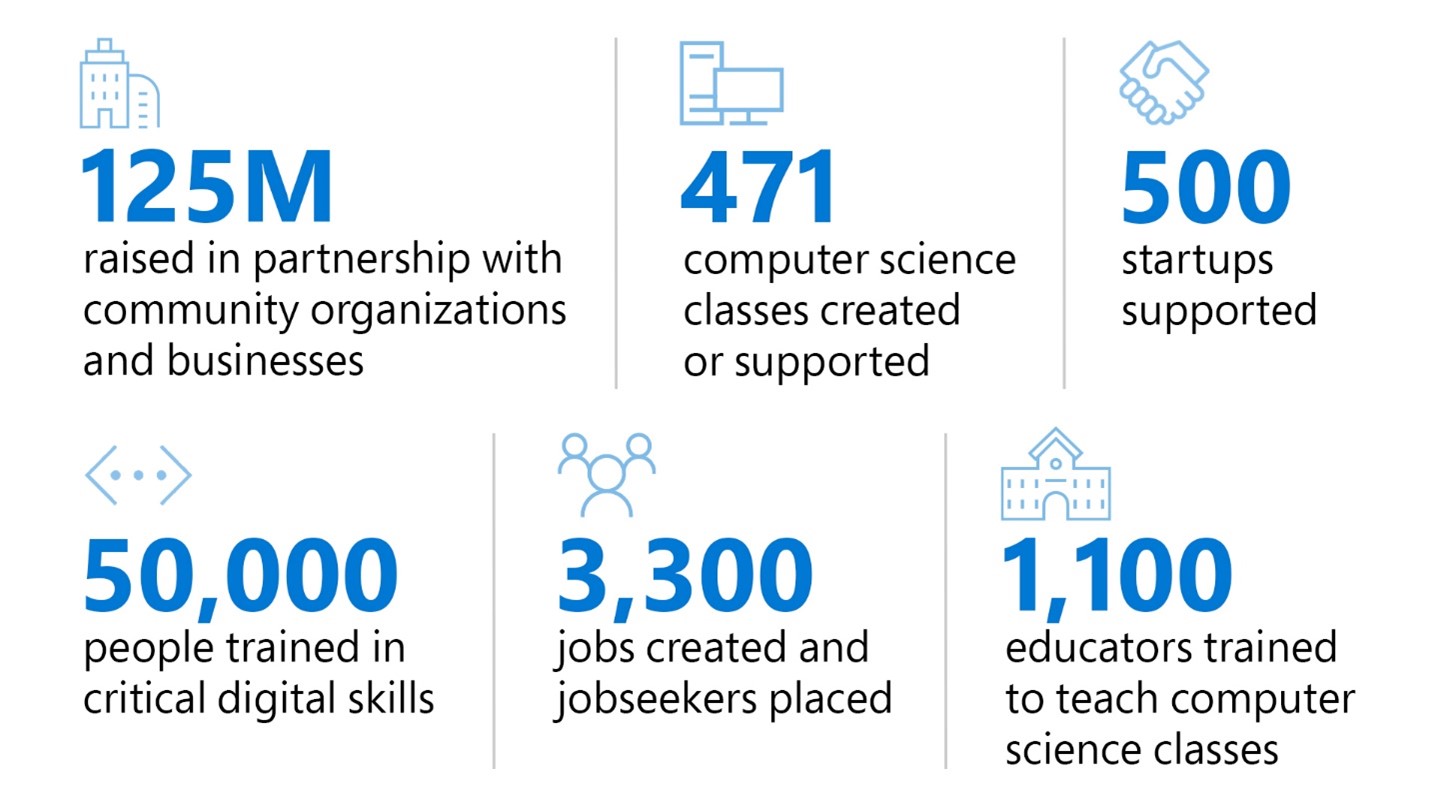Kate Behncken – Corporate Vice President, Microsoft Philanthropies
Talent is everywhere, but opportunity is not. Rapid advancement in technology is creating new opportunities in a digital economy, changing how we communicate, learn, work and access healthcare and other essential services. But these opportunities remain out of reach for many in rural communities, small or midsize cities, or underserved areas of larger metropolitan areas.
Five years ago, Microsoft launched the TechSpark program to accelerate economic growth in six communities across the United States and Mexico. Through TechSpark, we work with local community organizations to develop digital skills, support nonprofits and create jobs. Today, we are announcing the expansion of the program to all 50 states via a new TechSpark Fellows model.
We will expand from our eight existing TechSpark locations to communities across the United States, honing what we’ve learned and delivering a combination of funding and hands-on mentorship and training. In partnership with a local organization in each state, we will supply a grant to support a TechSpark Fellow to spearhead local efforts. This new work will be hyperlocal and partner-driven. And, as we have learned, having someone on the ground from the community, and deeply embedded in the community, is crucial to driving change. We’ll focus on four key issues:
And we want everyone to benefit from what we’ve learned to date, which is why we’re releasing a playbook and a resource hub to replicate and build on the things we’ve tried over the last five years. We hope it can be a resource for anyone looking to drive change in their community and help bolster the local economy.
Solving local problems
Communities across America are facing significant headwinds, especially in this economic environment. As the Brookings Institution notes, “Digitalization divides across and within places now stand as one of the nation’s starkest limits on opportunity.” There are certainly some constants across geography and demographics. Rural small business owners feel more uncertain about their future than urban counterparts. Significant areas of the country either don’t have access to, or can’t afford, broadband internet, according to Microsoft’s own research. And it’s often tough to raise money for startups outside major, coastal metropolitan areas – venture capital is overly indexed on the coasts.
It goes without saying that what one community in Wyoming needs might not be what one in Virginia requires. Needs vary tremendously even one town or one street over, as our Digital Equity Dashboard has demonstrated. That’s why broad national or state-wide programs often lack the focus to erase entrenched local problems. Instead, we should be listening to, and working directly with, the community first. TechSpark’s motto has always been: “Meet the community where they are.”
Our approach and impact
Since its inception, TechSpark has catalyzed new funding resources for communities, helped create new jobs, helped people gain critical digital skills, and supported new startups and local organizations. What we’ve learned
What we’ve learned
Through trial and error – and thanks to the advice and support of our local partners – we’ve learned a lot over the past five years. While some of the lessons were only applicable to a certain community – El Paso is very different than Southern Virginia, after all! – some lessons and learnings were universal:
What’s next
As the new TechSpark Fellows model unfolds, we’ll continue to share our learnings, providing regular public updates so that organizations outside the program can learn from what worked, and what didn’t – in line with our goal of empowering every person and organization on the planet to achieve more.
We launched TechSpark five years ago, to help communities realize the potential of technology and foster greater economic opportunity in U.S. cities. We’ve learned a lot, and found incredible people, partnerships, successes, and surprises. And we’re excited – and hopeful – to bring this community-first, community-driven model to the rest of the country.
For more information, we’ll be holding an information session on March 1 – sign up HERE.
Tags: El Paso, Microsoft TechSpark, rural broadband, Skills
Brad Smith
Ginny Badanes
Teresa Hutson
Courtney Gregoire
Irene Plenefisch
Burton Davis
Have the latest posts sent right to your inbox. Enter your email below.
By providing your email address, you will receive email updates from the Microsoft on the Issues blog.
Follow us:
